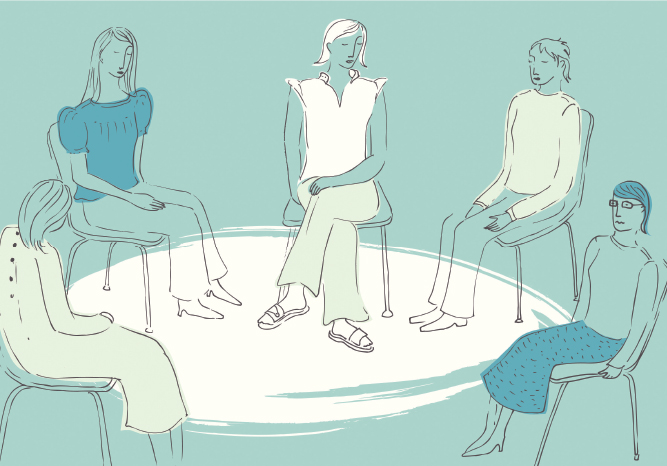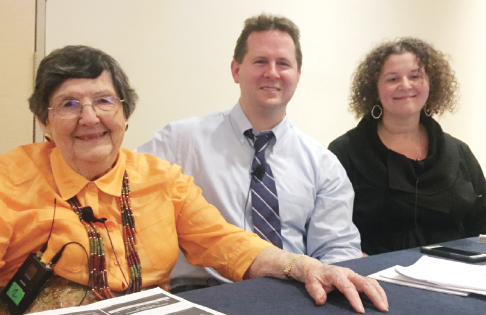
The goal of the MSK Lung Cancer Survivorship Program is to provide a forum for patients coping with advanced-stage disease and a venue to reduce their sense of isolation due to lung cancer stigma. © Getty Images. Illustration by Trina Dalziel
In 1996, Jimmie C. Holland, MD, the Wayne E. Chapman Chair in Psychiatric Oncology at Memorial Sloan Kettering Cancer Center (MSK) in New York, decided to launch the cancer center’s Lung Cancer Survivorship Program after she had a startling encounter with a patient. “The woman said to me, ‘Would you believe that I sit in the clinic wishing I had breast cancer because there are so many support care services for breast cancer survivors and none for us?’ That was enough of an impetus for me to launch the program,” revealed Dr. Holland.
The goal of the twice-monthly program, both then and now, is to provide a forum for patients coping with advanced-stage disease who are often facing not only a terminal illness, but a sense of isolation due to lung cancer stigma as well. Since its launch in 1996, more than 200 patients have been treated in the lung cancer support group program.
Although early detection and treatment advances for lung cancer are improving survival rates for patients, the disease remains the leading cause of cancer death for both men and women, and the 5-year survival rate is still a dismal 4% for patients with advanced disease.1 The cancer is associated with greater levels of psychological distress, including anxiety and depression, and reduced quality of life than any other cancer and is unique in the personal consequences of health-related stigma patients’ experience, such as fear of disclosing their illness to family and friends and increased social isolation. Studies show that regardless of smoking status—20% of patients who die of lung cancer were never smokers2—patients with lung cancer report feeling stigmatized by clinicians, family members, and friends because of the association between smoking and lung cancer and the perception that smoking is a choice rather than an addiction.3
“There is a sense of greater advocacy now for patients with lung cancer than there used to be, but there is still a lot of stigma associated with this cancer,” said Dr. Holland. “It is hard to cope with stage IV lung cancer; stigma adds to the sense of isolation.”
Challenge of Staying Connected
Some of the prevailing themes expressed by patients during Dr. Holland’s support group meetings are the same ones expressed more than 2 decades ago and include the fear of death and the dying process; guilt over smoking—cigarette smoking is linked to between 80% and 90% of lung cancers4; a sense of isolation; and how much to confide about their cancer prognosis to family members and friends.
Although the stigma patients with lung cancer face is less than it was when Dr. Holland started her support group, it remains a pervasive influence over their cancer experience.
There is a sense of greater advocacy now for patients with lung cancer than there used to be, but there is still a lot of stigma associated with this cancer.— Jimmie C. Holland, MD
Tweet this quote
“Many patients are hurt because their friends avoid them after they’ve been diagnosed with lung cancer,” said Dr. Holland. “The most common message from patients is, ‘I wish my family and friends would treat me the same way they did before I got sick.’”
The Lung Cancer Survivorship Program provides a safe haven for survivors to express their anxieties about cancer progression and treatment and fears about being a burden to loved ones. In addition, it is a venue where participants gain a shared sense of camaraderie and bond over discussions about the latest treatment advances and how to manage treatment side effects as well as where they may even find humor in their collective experience.
“The running joke often is, ‘I never buy green bananas or take out yearly magazine subscriptions anymore, because I’m not sure how long I’ll live,’” said Dr. Holland. “Laughter helps ease the tension when patients are feeling frustrated and know they can’t change their medical situation.”
The Promise and Disappointment of Immunotherapy
Although advances in genomic medicine in the treatment of late-stage lung cancer, especially immunotherapy checkpoint inhibitors that block programmed cell death protein 1 (PD-1) and programmed cell death ligand 1 (PD-L1) proteins, are extending lives for many patients, they are not providing long-term remissions at the same rate seen in other incurable cancers such as advanced melanoma. Furthermore, these advances may raise unrealistic hope and expectations for patients, complicating communication between patients and providers—an issue that is gaining momentum in group discussions in MSK’s Lung Cancer Survivorship Program.

Leaders of the MSK Lung Cancer Survivorship Program include, from left to right: Founder of the program, Jimmie C. Holland, MD, the Wayne E. Chapman Chair in Psychiatric Oncology; Daniel McFarland, DO, medical oncologist; and Liz Blackler, LCSW-R, MBE, Senior Clinical Social Worker.
“While we are hearing amazing stories from some patients about the remissions they are experiencing because of newer therapies, including immunotherapies, unfortunately, that is not everyone’s experience,” said Daniel McFarland, DO, a medical oncologist in the Department of Medicine at MSK in West Harrison, New York, and a group leader in the Lung Cancer Survivorship Program. “Although there are many stories of hope, there are also many feelings of regret or frustration when patients don’t have the target mutation for a specific therapy and their cancer is advancing. And even when a therapy is effective, patients can have difficulty coping with the uncertainty of how long the effect will last.”
The result places patients in a life and death catch-22 in which they are unsure of how to prepare for living or dying. “This dichotomy occurs now more often, as patients on some targeted therapies live comfortably without symptoms over years. They begin to feel perhaps they are truly survivors. Their level of health contrasts with that of others in the group whose illness is progressing. This leads to an outpouring of empathy and concern by the group for the patients who are not doing well, which is often tinged with guilt by those who feel they are looking forward to long survival, although they recognize the uncertainty of outcome persists even after a long and robust response to therapy,” explained Dr. Holland.
It is harder now to help patients and family members make the transition from living to dying because they have a hard time believing they have exhausted all treatment options.— Liz Blackler, LCSW-R, MBE
Tweet this quote
“Even though we are seeing more late-stage patients live multiple years on maintenance therapy, they are still in the minority,” added Liz Blackler, LCSW-R, MBE, Senior Clinical Social Worker in the Department of Social Work at MSK and a group leader in the lung cancer support program. “And their success on a new therapy changes the group dynamic, because now there are more questions about how to live with cancer and its treatment-related complications and fewer questions about end-of-life care. It is harder now to help patients and family members make the transition from living to dying because they have a hard time believing they have exhausted all treatment options. And when patients are still on active treatment, even if the benefit is small or nonexistent and their quality of life is not good, it helps them postpone thinking about the possibility of death.”
Communicating in the Age of Precision Medicine
In recognition of the communication challenge advances in oncology care pose for patients with incurable cancers and the oncologists who treat them, Dr. Holland, Dr. McFarland, Ms. Blackler, and their colleague Smita Banerjee, PhD, Assistant Attending Behavioral Scientist at MSK, published an article, “Communicating About Precision Oncology,” detailing how the increasing reliance on genomic-based treatments and their expected outcomes are complicating informed consent, shared decision-making, and patient autonomy and heightening uncertainty in oncology treatment outcomes.5 The article presents some common patient reactions to a range of precision medicine scenarios and offers guidance on working with each type of scenario using the Shared Decision-Making Framework communication model to help patients cope with their medical situation in this new era of precision medicine.
We may not be able to offer these survivors a cure, but we can offer them comfort.— Daniel McFarland, DO
Tweet this quote
“What is impressive to me is that cancer survivors are living longer with more optimism and better quality of life, but assuring adequate communication is more complex,” Dr. Holland shared.
Forthrightly addressing patients’ underlying hopes and fears about their prognosis, assessing their understanding about the limitations of new treatments, and walking the tightrope of maintaining realistic hope in the presence of incurable cancer are ways to ensure patients’ values and preferences are maintained throughout their continuum of care and at the end of their life, according to authors of this article.5
Confronting Death
“When patients ask about their chances of dying, I am honest with them and explain that while there is no cure, we will do everything we can to give them as much time as possible, but there will come a time when treatment will stop working. With new agents, this is hard for patients to hear. We try to help patients acknowledge the seriousness of their situation while supporting them and finding ways to make them feel less fearful,” said Ms. Blackler.

© IStock/Getty Images
Sometimes, according to Dr. McFarland, patients are looking to their oncologist for confirmation about what their prognosis actually means. “I had a patient who was dying and had accepted that fact, but he felt compelled to ask me one more time, ‘Can we get rid of this cancer?’ And it was okay that he asked the question again. I knew he knew the answer. He just needed to ask me one more time. It was part of his acceptance process. It is a hard reality to come to terms with your mortality,” said Dr. McFarland.
Dr. Holland agreed. “I rely on the observation of Avery D. -Weisman, MD, who was my mentor. He described middle knowledge as the ability of a patient with advanced disease to cognitively recognize the reality of facing death but being able to deny the fact at other times. He called this ‘uncertain certainty,’” she added.
Seeking Comfort From Others
What makes disease-specific support groups like MSK’s Lung Cancer Survivorship Program so rewarding for patients with advanced cancer is the sense of relief they feel over not being alone. “We normalize the trajectory of what is happening to the patients in our group, and that is what makes what we do so therapeutic for them and gives them something to look forward to every 2 weeks,” said Dr. McFarland. “Our support group provides a way for these patients to regain a social life they might have lost when they were diagnosed. Sometimes the patients in our group don’t know anyone else with lung cancer, and the group gives them back a sense of community and belonging. We may not be able to offer these survivors a cure, but we can offer them comfort.” ■
DISCLOSURE: Drs. Holland and McFarland and Ms. Blackler reported no conflicts of interest.
REFERENCES
1. American Cancer Society: Cancer Facts & Figures 2017. Available at https://www.cancer.org/content/dam/cancer-org/research/cancer-facts-and-statistics/annual-cancer-facts-and-figures/2017/cancer-facts-and-figures-2017.pdf. Accessed December 6, 2017.
2. American Cancer Society: Lung Cancer Risks for Non-smokers. Available at https://www.cancer.org/latest-news/why-lung-cancer-strikes-nonsmokers.html. Accessed December 6, 2017.
3. Brown Johnson CG, Brodsky J, Cataldo JK: Lung cancer stigma, anxiety, depression, and quality of life. J Psychosoc Oncol 32:59-73, 2014.
4. Centers for Disease Control and Prevention: What Are the Risk Factors for Lung Cancer? Available at https://www.cdc.gov/cancer/lung/basic_info/risk_factors.htm. Accessed December 6, 2017.
5. McFarland DC, Blackler E, Banerjee S, et al: Communicating about precision oncology. J Clin Oncol Precision Oncology. August 7, 2017 (early release online)
PATIENTS SHARE THEIR THOUGHTS ON THE LUNG CANCER SUPPORT GROUP
- “One of the most important things about the group is that I am no longer alone. The worst thing is being afraid when you are alone.”
- “I don’t want to be out in the world, because I feel as if I’ve just been shut out of it.”
- “I don’t tell people [about my lung cancer] because I’m afraid if they know my diagnosis, they’ll treat me differently.”
- “Until you go through this, you cannot realize the depth of fear.”
- “Living with lung cancer is like living with a loaded gun pressed up against your head. How do you [live through] it? By taking one day at a time.”

